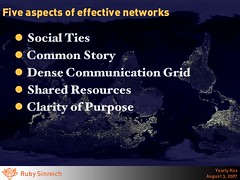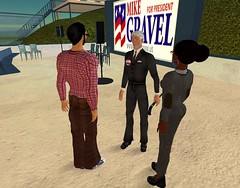Oops, I was just about post some links to the panels I am on at Yearly Kos, but it appears the online schedule has been removed to avoid “inaccuracies” in favor a of PDF (which unfortunately does not list the sessions by time and day). So you can check that out if you want to browse the whole enchilada.
Anyway, here are the two sessions that I am participating in:
Promotion, Publicity, Powncing and Partnerships
Say hello to my little friend — marketing. Get the low down from successful bloggers on building readership, creating innovative partnerships, making the most of links/trackbacks/hat tips, and cool new tech tools to increase your outreach to get your hard-earned work noticed. Bring your problems for on-the-spot troubleshooting.
Panelists: Ruby Sinreich, David Kravitz, Raf Noboa, Bob Neer, Conor Kenny
Thursday, Aug 2, 12:30-2:00 10d
The above session was supposed to be about local blogging, which is why I agreed to participate. Not only do I not do anything to “promote” OrangePolitics, I’m a little bit opposed to the idea. But I can certainly talk about social networking in general, and how it’s always good. 😉 And then there’s this, where I expect to talk about network-centric advocacy principles in 10 minutes or less:
Politics 2.0: How Social Networks and New Media Are Changing Politics
Social networks and new media are playing an increasingly visible role in our politics and activism. YouTube videos, MySpace bulletins, Facebook friends, not to mention new communities like Change.org, Eventful.com and Twitter, are being used by politicians, organizations and activists to communicate, connect and campaign. This panel will explore the unique ways in which this new media environment is having an impact on politics as usual, the strategy and tactics being employed and best practices that are emerging in this 2.0 world.
Panelists: Stephanie Taylor, Amy Rubin, Beka Economopoulos, Ruby Sinreich
Friday, Aug 3, 10:30-11:30 404a-c

